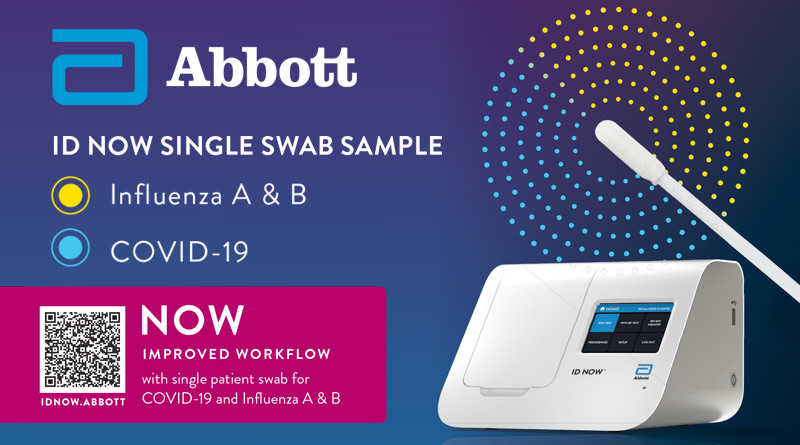How Rapid Point of Care Testing for Influenza Has Helped to Reduce Care Home Closures

Sarah Turner talks about how rapid point of care testing for influenza has played a key role in reducing care home closures within Stockport Metropolitan Borough Council since the winter of 2018/19.
Every year, the winter season brings with it an increased risk of colds, flu and respiratory infections. These can often exacerbate the seriousness of existing health problems and impact the most vulnerable members of society.
Care home managers are all too aware of the risk that flu outbreaks within care homes can bring, with the months from November to March being an acutely difficult period for local health services to manage winter pressures.
During the winter of 2017/18, an estimated 50,100 excess winter deaths1 were recorded in England and Wales – the highest recorded since winter 1975 to 1976. The borough of Stockport was no different, with ten care homes closing due to flu outbreaks.
Sarah Turner, Health Protection Service Lead and Nurse Consultant for Stockport Metropolitan Borough Council, said: “In the winter of 2017, we had a difficult flu season in Stockport, with ten care homes closing due to the levels of infection within them. The care home closures were in place for 127 days, which had a significant knock-on impact on Stockport NHS Foundation Trust’s ability to admit new patients because of pressure on beds, as the hospital was unable to discharge care home patients back into the community.”
At that stage, Sarah’s team was using the reference lab at Manchester Foundation Trust to process PCR flu tests for the Stockport area.
SARAH: “In order to effectively implement virus control plans to manage flu outbreaks in care homes, we had to follow an extensive process. Firstly, we had to visit the affected care homes and carry out the testing. We would then need to arrange for couriers to take the samples to the hospital which was located around ten miles away. Once this was complete, we’d have to wait for the samples to be processed which could take anywhere between 48 hours to a week due to the unprecedented circumstances.”
It became evident that a faster process was needed, and as part of Sarah’s role within the Stockport Local Health Protection Team, she was tasked with finding a solution to improve the winter pressures of the flu season by reducing the amount of time care homes were closed for during a flu outbreak.
Sarah was attending the Infection Prevention Society Conference in 2017, where she was first introduced to Abbott’s ID NOW™ molecular point of care testing platform2, which can deliver positive flu results within in five minutes and negative results within 13 minutes – testing for other respiratory pathogens delivers even faster results.
She wished to take advantage of this solution for testing for influenza in the care homes, however, before she was able to implement the ID NOW platform as part of Stockport Metropolitan Borough Council’s winter strategy to managing flu outbreaks, she needed to develop a business case for the Director of Adult Social Care and Director of Public Health to receive investment for the ID NOW platform.
SARAH: “My team were in a unique position. We operated as part of the public health function for the local council and were not directly linked to any hospitals, so before we could get to a stage where we could routinely use point of care testing within care homes, we had to submit a business case to the local authority, because it was having the biggest impact on the adult social care provision.”
In addition to the business case, a number of steps had to be taken to ensure the new way of working would be compliant with Stockport NHS FT procedures. This included liaising with microbiologists, the point of care testing team, Stockport NHS FT laboratory, and carrying out an external quality assessment (EQA).
SARAH: “As part of developing the standard operating procedure, we confirmed that the swabs and the sample collection reagents used for testing with the ID NOW platform were all compliant with the hospital’s regular processes.
To allow for comparison testing between the results, we ran a project that involved sending every sample we analysed with the ID NOW platform to the laboratory for PCR testing and found that they produced exactly the
same results.”
Following the EQA test, the business case was approved, and Sarah’s team began consulting with the managers and staff in care homes across the borough to implement the ID NOW platform during the winter season of 2018/19. During this period they experienced nine outbreaks compared to ten outbreaks in 2017, with closures reducing from the previous 127 days to just 25 days in 2018/19.
SARAH: “This was down to the fact that we were getting results within 15 minutes and were able to action antivirals on the same day, therefore releasing care homes from restrictions after five days rather than waiting a longer period of time. By using faster on-site testing methods, care homes could navigate through the winter months as safely as possible.
“It also had a significant impact on mortality rates in care homes. For example, in 2017/18 before we introduced the service, one care home was closed for 28 days with four reported deaths during that period. However, in 2018/19, when our POCT service was running, we had no reported deaths.
“To deliver this groundbreaking work, we worked closely with the managers and staff from Stockport care homes. Their ongoing efforts to recognise symptoms at an early stage helped to support the testing process and establish a clear pathway for those who needed treatment.
In 2013, when public health services were transferred from the NHS to local government, Sarah and her team already had an existing network of relationships within the care homes.
As a result, they were able to continue building on these connections when carrying out the annual infection, prevention and control assessments, helping to pave the way for the continuation of point of care testing using the ID NOW platform from the winter of 2018/19.
SARAH CONTINUED: “Implementing point of care testing with the support of the care home staff helped to keep residents safe, by providing my team with the tools to identify infections based on a rapid evidence-based approach, and administer antiviral medication at an earlier stage, improving health outcomes for patients. Point of care testing also meant that my team was able to support care home staff in keeping care homes open for both residents and visitors, whilst enabling a smoother transition between primary care, secondary care and the community setting.”
Her team also had strong relationships with wider stakeholders including the pathology staff, general practice staff including doctors, and nursing and care home staff. This was because rapid diagnostics was reducing pressure on other parts of the healthcare system, and maintaining the flow of pathways between the hospital and care homes.
SARAH: “Using the ID NOW platform has revolutionised those relationships. We are now the first port of call for care homes across the borough, providing an end-to-end service for staff and residents through administering the testing, identifying infections, and supporting in prescribing antivirals for symptomatic patients, all within 24 hours.”
“We can now turn around an outbreak of flu within a day rather than a week, which results in less closures and allows families and visitors to come back in as soon as possible, supporting continuity of care and providing better health outcomes for residents.”
This year, as part of wider plans to expand point of care testing in care homes, the Local Health Protection Team will continue to work with care home staff to begin testing for COVID-19 with the ID NOW platform as part of the local authority’s 2023/24 winter pressures management plan.
SARAH: “There is an expectation for this work to continue and expand, because introducing early interventions to diagnose unwell patients as quick as possible will ultimately lead to reduced hospital admissions and improved health outcomes for the residents in the long-term.”
Talking about where else she would like to see this approach implemented, Sarah said: “I recommend the use of the ID NOW platform to colleagues within other local authorities, primary care and out of hours services, so that testing can continue beyond the Monday to Friday, 9am-5pm operation that we are able to carry out.
“With the right mitigation, management and appropriate communication, we can continue to promptly identify respiratory illnesses, and implement infection control guidance, ultimately reducing transmission of the flu to other vulnerable residents in care homes.”
SARAH: “Using the ID NOW platform has revolutionised those relationships. We are now the first port of call for care homes across the borough, providing an end-to-end service for staff and residents through administering the testing, identifying infections, and supporting in prescribing antivirals for symptomatic patients, all within 24 hours.”
1 https://www.ons.gov.uk/peoplepopulationandcommunity/birthsdeathsandmarriages/deaths/bulletins/excesswintermortalityinenglandandwales/2017to2018provisionaland2016to2017final
2 https://www.abbott.co.uk/content/dam/corp/abbott/en-gb/panbio/ID-NOW-Influenza-A-B-2-Product-Sheet-EME-English.pdf

